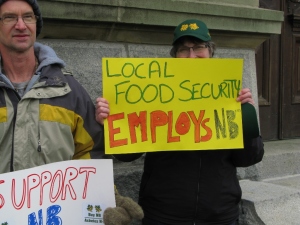Report from the Legislature
The implications of Finance Minister Roger Melanson’s choices in his first budget are emerging as the Committee on Estimates and Fiscal Policy examines the details, department by department. This has created an endless source of material for question period and plenty of public outcry. In particular, funding cuts to private childcare centres and increased costs for nursing home residents are of great concern to many.
I am not officially a member of the Committee on Estimates and Fiscal Policy, but I have been attending all of its meetings. Any MLA has the right to ask questions of the Minister. The Committee has 80 hours to examine the budgeted expenditures and revenues of every government department, all of which is televised. There are no rules about how the 80 hours should be shared among opposition parties. By negotiating with the PC House Leader, I managed to carve out six and a half hours of questions from the eighty hours. The six Liberal committee members ask no questions, leaving me to wonder what is the point of having them there, if the committee doesn’t actually function as a committee. They get paid their allowance as committee members, but their role is to simply vote in favour of each departmental budget once opposition members have finished their questions.
Ministers wait until it is their turn at the committee to speak to the consequences of their budget changes, sometimes holding announcements to the next day, such as Health Minister Victor Boudreau’s plan to contract out the management of hospital cleaning and food services to a foreign company. I also uncovered the decision by government to contract out the management of energy auditing services to a Toronto-based company for NB Power’s version of a provincial home insulation program – the replacement for the one lost with the dismantling of Efficiency New Brunswick by theGallant government.
Many of the controversial budget changes have been made without thinking about the consequences. Cutting support for private childcare centres raises costs for parents and risks forcing the smaller ones to close, sending parents scrambling to make alternative arrangements. Low income single parents who can’t afford the increases could face the prospect of having to leave their jobs or abandon their education and go on social assistance.
The firestorm that erupted over calculating the cost of care for seniors entering a nursing home based on savings (other than RRSPs) in addition to income, clearly was not contemplated by the Gallant government. Social Development Minister Cathy Rogers estimates that this will reduce the government’s costs of supporting nursing home care by $1.6 million. While everyone’s focus was on the government deciding to consider seniors’ assets in calculating their cost of living in nursing a home, the cap on the daily maximum will be raised by 55% from $113 per day to $175 per day. While 85% of nursing home residents don’t have enough annual income to pay the current maximum of $113, the 15% who have higher incomes will pay up to $175 per day – a 55% increase and the highest maximum cost in the country. This is expected to save the province $6.2 million per year out of a nursing home budget of around $330 million.
With 80 percent or more of the costs of nursing homes being borne by government, perhaps it is time to bring them under our healthcare system. After all, the reason about 6% of seniors find they need nursing homes is because they need nursing care for health reasons.
My Local Food Security Bill went down to defeat at Second Reading, ostensibly because the Minister of Agriculture, Aquaculture and Fisheries wanted to consult with interest groups first. If that were the case, the bill should have been passed and sent to committee for study where any interest group or citizen could provide their views to help inform possible amendments to the bill. The Official Opposition agreed to support my request for a recorded vote where all members must stand and be counted as to whether they support the bill or not (two MLAs must request this, so I can’t do it by myself). Sadly, our Legislative Assembly is still trapped in partisan purgatory, where MLAs don’t dare vote differently from their party, and despite what they believe their constituents would support in the best interests of the province.
My bill to enable 16 and 17 year olds to vote is trapped in its own kind of purgatory. After passing second reading, it awaits a decision by the government to send it to committee for study. If no decision is made, it will die a quiet death.
The third bill I introduced will come up for Second Reading in early June. This bill is designed to return the authority over forest management and wood allocations for the next 25 years to the Department of Natural Resources by annulling the contracts it signed with forestry companies, which effectively transferred this authority to them.
This week, the House is adjourned while committees continue their work on the budget estimates and examining government bills that have passed Second Reading.

